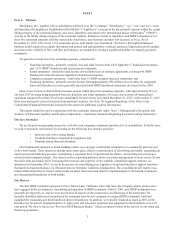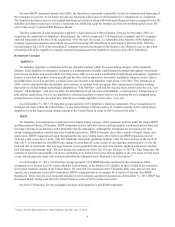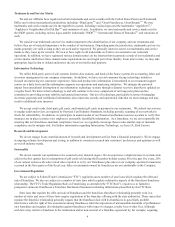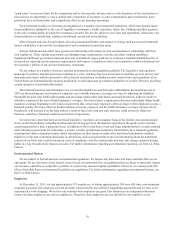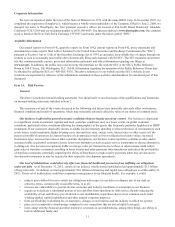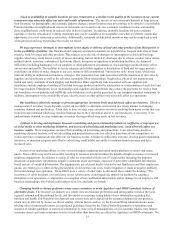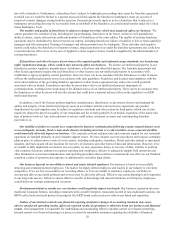IHOP 2015 Annual Report Download - page 32
Download and view the complete annual report
Please find page 32 of the 2015 IHOP annual report below. You can navigate through the pages in the report by either clicking on the pages listed below, or by using the keyword search tool below to find specific information within the annual report.12
• result in an event of default if we fail to satisfy our obligations under our debt or fail to comply with the financial and
other restrictive covenants contained in our debt documents, which event of default could result in all of our debt
becoming immediately due and payable and could permit certain of our lenders to foreclose on our assets securing
such debt.
In addition, we may incur substantial additional indebtedness in the future. If new debt is added to our current debt levels,
the related risks that we now face could intensify.
The terms of the securitized debt issued by certain of our indirect, wholly-owned subsidiaries have restrictive terms and
the failure to comply with such restrictive terms could put us in default, which would have an adverse effect on our business
and prospects. Unless and until we repay all outstanding borrowings under our securitized debt, we will remain subject to the
restrictive terms of the securitized debt issued by certain of our indirect, wholly-owned subsidiaries. For example, the
indenture entered into by such subsidiaries in connection with the securitized debt contains covenants that limit the ability of
certain of our wholly-owned subsidiaries to, among other things: sell assets; alter the business conducted by such subsidiaries;
engage in mergers or acquisitions; declare dividends or redeem or purchase certain equity interests; incur, assume or permit to
exist additional indebtedness or guarantees; make loans and investments; incur liens; and enter into transactions with affiliates
other than on an arms-length basis. These covenants are applicable only to the securitization subsidiaries and do not apply to
any of DineEquity, Inc., International House of Pancakes, LLC or Applebee’s International, Inc. as these entities are not a party
to the indenture. A breach of a covenant could result in a rapid amortization event or default under the securitized debt.
Further, the securitized debt also includes limitations on our ability to incur additional indebtedness and contains a number
of financial performance measures that must be met to avoid a possible rapid amortization event or event of default. The most
significant of these measures include a minimum debt service coverage ratio and minimum domestic franchise system sales.
The ability to meet these financial performance measures can be affected by events beyond our control and there can be no
assurance that we will satisfy these financial measures.
If amounts owed under the securitized debt are accelerated because of a default and we are unable to pay such amounts, the
investors may have the right to assume control of substantially all of the securitized assets, which consist of substantially all of
our domestic revenue-generating assets and domestic intellectual property.
During the seven-year term following issuance, the outstanding fixed-rate senior notes will accrue interest at a rate of
4.277% per year. Additionally, the fixed-rate senior notes have scheduled quarterly principal amortization payments of $3.25
million. If we maintain a leverage ratio of less than or equal to 5.25x total debt to EBITDA, we may elect to not make the
scheduled principal payments. If we are unable to refinance or repay amounts under the securitized debt prior to the expiration
of the seven-year term, our cash flow would be directed to the repayment of the securitized debt and, other than a weekly
management fee sufficient to cover minimal selling, general and administrative expenses, would not be available for operating
our business.
In the event that a rapid amortization event occurs under the indenture (including, without limitation, upon an event of
default under the indenture or the failure to repay the securitized debt at the end of the seven-year term), the funds available to
us would be reduced or eliminated, which would in turn reduce our ability to operate or grow our business.
No assurance can be given that any refinancing or additional financing will be possible when needed or that we will be
able to negotiate acceptable terms. In addition, our access to capital is affected by prevailing conditions in the financial and
capital markets and other factors beyond our control. There can be no assurance that market conditions will be favorable at the
times that we require new or additional financing.
We are heavily dependent on information technology and any material failure of that technology could impair our
ability to efficiently operate our business. We rely heavily on information systems across our operations, including, for
example, point-of-sale processing in our and our franchisees' restaurants, management of our supply chain, collection of cash,
payment of obligations and various other processes and procedures. Our ability to efficiently manage our business depends
significantly on the reliability and capacity of these systems. The failure of these systems to operate effectively, problems with
maintenance, upgrading or transitioning to replacement systems, fraudulent manipulation of sales reporting from our
restaurants resulting in loss of sales and royalty payments, or a breach in security of these systems could be harmful and cause
delays in customer service and reduce efficiency in our operations. Significant capital investments might be required to
remediate any problems.



